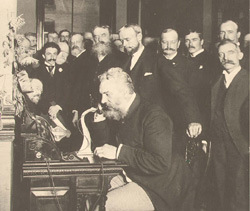March 27, 1884, is the date the first long-distance telephone line was completed from New York City to Boston. Over the next eight years, lines were opened between New York and Philadelphia, Atlanta and Chicago, and New York and Chicago. One hundred one years ago, the first transcontinental telephone call was made by Alexander Graham Bell. Later that day, President Woodrow Wilson used the connection to speak from the White House to an audience in San Francisco. He said, “It appeals to the imagination to speak across the continent.” I am fascinated by progress that’s been made in communication. I can remember the first car phones, the first cordless phones, and the first big cell phones! Now we can talk to people all over the world – and see them while we talk! I wonder what lies ahead.
Colossians 4:6 Let your speech always be gracious, seasoned with salt, so that you may know how you ought to answer each person.
~N



